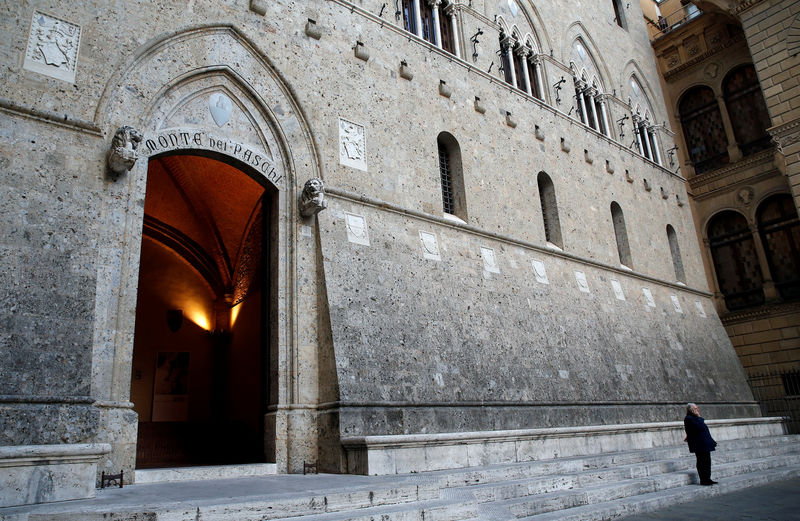By Silvia Aloisi
MILAN (Reuters) - A 5 billion euro ($5.33 billion) rescue plan for Italian bank Monte dei Paschi di Siena (MI:BMPS) hung by a thread on Monday after Prime Minister Matteo Renzi's defeat in a referendum tipped the country into political turmoil.
The world's oldest bank, saddled with 46 billion euros of bad loans, needs to raise the money by the end of the month to avoid being wound down, but Italy could now face early elections after Renzi said he would quit to take responsibility for the defeat of his constitutional referendum.
Monte dei Paschi, rated the weakest lender in European stress tests this summer, had planned to secure a firm commitment from one or more anchor investors and launch a share sale as early as Wednesday or Thursday.
If Monte dei Paschi's private recapitalization plan fails, the Italian government is expected to step in and pump public money into the bank to avoid a crisis, bankers and European officials said.
The lender's shares fluctuated wildly in early Monday trade, with investment banks meeting to decide whether to back the cash call. Under a pre-underwriting deal, they can drop the transaction due to adverse market conditions.
The bank's board was expected to convene on Tuesday.
Renzi announced he would step down in the early hours of Monday after his constitutional reform was rejected by 59.1 percent of voters, a wider margin than had been expected.
Italian government bonds and shares fell sharply early on Monday, as investors worried that instability in the euro zone's third-largest economy could reignite a financial crisis and deal a blow to the country's fragile banking sector.
But financial markets pared losses later in the morning as fears of snap elections faded and European officials and allies played down the prospect of a broader euro zone crisis.
Monte dei Paschi was down just 1.6 percent having earlier shed as much as 10 percent. UniCredit (MI:CRDI) shed 4 percent after dropping as much as 6 percent at the open.
"I simply don't think the numbers are there to do it for Monte dei Paschi any way. I had already serious doubts about the deal in the event of a 'yes’ vote, it seems to me the ‘no’ vote will be the perfect excuse to walk away," said the investment chief of a European hedge fund, speaking on condition of anonymity.
European Central Bank Governing Council member Ewald Nowotny said Italy, which unlike Germany and other European countries has used very little public money to prop up its lenders, might have to bail out some banks.
But he said market concerns about Italy's financial sector should be kept in perspective and any problems there were manageable.
Any state intervention to help Monte dei Paschi would entail losses for the bank's subordinated bondholders in line with European bank crisis rules - something Renzi's government had sought to avoid at all costs to stave off the risk of a run on deposits and a domino effect engulfing other lenders.
It was not immediately clear to what extent retail investors, who hold 2.1 billion euros of Monte dei Paschi junior debt, could be spared in the event of a state rescue.
Even at the height of the euro zone's debt crisis, Italy had resisted calls to inject public money into its banks or ask for an EU bailout. But it is running out of private solutions to cure the sector, which is burdened by 360 billion euros of bad loans accumulated during a harsh recession.
Italy's 4.25 billion euro Atlas fund, created this year to help channel private funds into struggling banks, has seen its coffers dry up as banking crises mushroom around it.
Two banks from the Veneto region that were rescued with a 2.5 billion euro capital injection by the fund in the spring need another 2.5 billion euros in fresh capital soon, analysts say. And four small lenders bailed out by healthier banks last year also need more money to clean up their balance sheets.
Meanwhile, a failure of Monte dei Paschi's rescue scheme risks complicating UniCredit's own capital-raising plans.

Italy's largest bank by assets is expected to unveil on Dec. 13 a cash call for up to 13 billion euros, to be launched early next year.